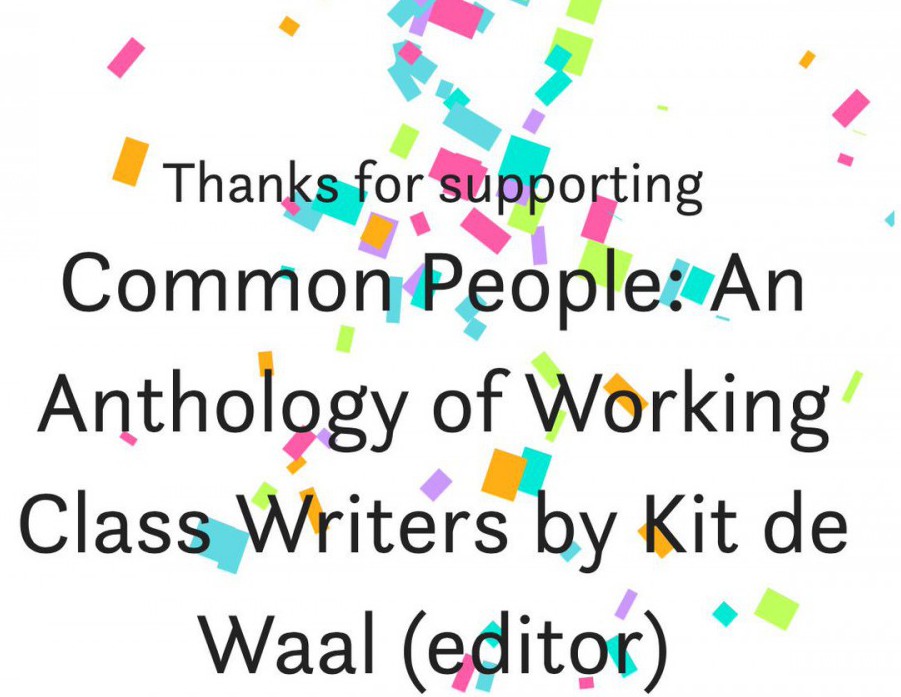Inspiring Older Readers
 posted on 15 Mar 2018
posted on 15 Mar 2018
With all this confusion it’s hardly surprising that the value of working class writing is so frequently overlooked.
The excellent Kit de Waal has recently used her growing reputation to highlight the shameful neglect of working class authors within a book industry that is, and has historically been, dominated by middle class interests and a cultural media that sees the working class as either problematic or exotic. In her extended essay for The Guardian in February of this year she noted:
A 2016 paper, published by Dr Dave O’Brien of Goldsmiths estimated that almost half – 47% – of all authors, writers and translators hail from professional, middle-class backgrounds, compared with just 10% of those with parents in routine or manual labour. This analysis, of the 2014 British Labour Force Survey, also identified that 43% of people working in publishing, including those in the influential editorial roles, were from middle-class origins, with only 12% from working-class backgrounds. As Chris McCrudden, a communications planner who dissects data on publishing trends, says: “Publishing is an upper-middle class industry whose output caters to upper-middle class tastes.”
Her attempts to throw back the cover on issues that have not only prevented the working class from participating in literary culture as meaningfully as they might but which have also degraded, demeaned and marginalised those that have written and published, are entirely laudable and to be encouraged.
However, this does raise the question of whether we have anything like a sensible, intelligent or subtle enough public debate about the nature of social class in this country that would enable us to better understand the forces at work here.
All too often the public discussion of class finds itself overwhelmed by a failure to distinguish between income and access to ‘opportunity’ – so-called social mobility – and social class as cultural heritage. I suspect that this is the influence of the US concept of class in which they seem to define the phenomenon exclusively on the grounds of earned income and social status.
I have personally always felt that this very materialistic way of thinking about class is to miss something quite crucial. I have had a modest but above average income for most of my white-collar working life, I have a university education (curtesy of grant aid) and I face a retirement with a superannuation to supplement my state pension. But despite all of this I have never for one moment had any doubt that I was working class.
I entirely reject the idea of class as a hierarchy or as ladder that we should be straining to climb and I have no desire to ‘trade’ my working class cultural heritage for a middle class one I have no feeling for or understanding of.
Crucially, I don’t consider being working class in any sense inferior (or superior) to being middle class nor do I think of it as something to escape from. In this respect I find the work of Raymond Williams and E.P.Thompson on class provides a more convincing model when they speak of class as a ‘structure of feeling’ – a sense of having a common heritage that links me to my past and makes sense of my feelings about the present.
I doubt very much whether a book world dominated by middle class writers with middle class concerns can really understand this. I thought it might be interesting to test this by Googling ‘working class writers’ and seeing what they offered me. As I suspected up came the names of writers like George Orwell or Nell Dunn – both of whom wrote about and made common cause with working class issues but who by no stretch of the imagination could be considered working class themselves.
This idea that working class writing is that which is produced by writers who want to speak about the working class as opposed that that which is by working class authors speaking for themselves is a crucial distinction and one the book world constantly confuses.
I really hope things are changing as de Waal says:
Within the mainstream publishing industry, too, there is appetite for change. Penguin has launched Write Now, an initiative to find new writers from diverse backgrounds; it no longer requires its new job applicants to have degrees. Many other publishers now pay their interns and provide traineeships. I am editing an anthology of working-class memoirs called Common People, for the crowdfunding publisher Unbound, with contributions from Malorie Blackman, Damian Barr, Louise Doughty, Cathy Rentzenbrink, Stuart Maconie, Jill Dawson and Tony Walsh, people who might not immediately spring to mind when you think of the working-class writer. Sixteen unknown writers will be published alongside them.
Working-class stories are not always tales of the underprivileged and dispossessed – these are narratives rich in barbed humour, their technique and vernacular reflecting the depth and texture of working-class life, the joy and sorrow, the solidarity and the differences, the everyday wisdom and poetry of the woman at the bus-stop, the waiter, the hairdresser.
But, honestly, I remain sceptical. There is and always has been a middle class cultural hegemony in literature and it will be hard to break down. Cyril Connolly, a public schoolboy himself, talked about the ‘enemies of promise’ and the inability to engage in high culture because of the ‘pram in the hallway’ and this overweening, patronising attitude still, I think, dominates.
Perhaps as an indication of good will publishers could go back and retrieve, republish and promote the lost working class authors of the past – much in the same way as Virago has tried to do for invisible, marginalised women authors.
But despite all of Kit’s great advocacy – and I’ll support her aims all I can - I’m not holding my breath………
Terry Potter
March 2018